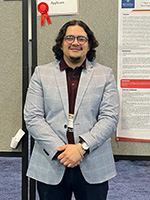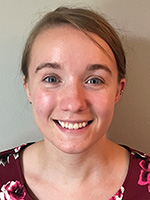ASPET is proud to announce the selection of 10 awardees to participate in the 2024-2025 Washington Fellows program. The mission of the Washington Fellows program is to enable developing and early-career scientists interested in science policy to learn about and become more engaged in public policy issues. Get to know this year’s class.
Kari Gaither, PhD – Washington State University
 Kari is from a small rural town in central Washington state and is a first-generation college graduate. She received her Bachelor of Science in Molecular Biology at The Evergreen State College in Olympia, Wash., and her PhD in Pharmaceutical Sciences at Washington State University. Kari was awarded a National Science Foundation Graduate Research Fellowship to study cancer biology with an initial focus on cancer immunotherapy in a model of chronic alcoholism. She further went on to study the role of small RNA modulation of a cancer therapy target under the backdrop of cellular stress. To expand her capabilities, she completed a postdoctoral research appointment at Pacific Northwest National Laboratory, where she assessed metabolism of polycyclic aromatic hydrocarbons in human liver via activity-based proteomics and pharmacokinetics. This piqued her interest in metabolism of exogenous compounds, leading to a second postdoc in the lab or Dr. Bhagwat Prasad. In her current studies, she uses global proteomics and metabolomics to investigate changes in Phase I and II enzymes and transporters in human liver tissue and hepatocytes induced by chronic alcoholism. Kari has a passion for effective science communication and engaging diverse audiences in STEM. She has been actively engaged in outreach and science advocacy and has participated in multiple Capitol Hill days. As an ASPET Washington Fellow, she hopes to build on her communication skills and leadership experience with a better understanding of how to use science policy to effectively advocate for increased funding for research.
Kari is from a small rural town in central Washington state and is a first-generation college graduate. She received her Bachelor of Science in Molecular Biology at The Evergreen State College in Olympia, Wash., and her PhD in Pharmaceutical Sciences at Washington State University. Kari was awarded a National Science Foundation Graduate Research Fellowship to study cancer biology with an initial focus on cancer immunotherapy in a model of chronic alcoholism. She further went on to study the role of small RNA modulation of a cancer therapy target under the backdrop of cellular stress. To expand her capabilities, she completed a postdoctoral research appointment at Pacific Northwest National Laboratory, where she assessed metabolism of polycyclic aromatic hydrocarbons in human liver via activity-based proteomics and pharmacokinetics. This piqued her interest in metabolism of exogenous compounds, leading to a second postdoc in the lab or Dr. Bhagwat Prasad. In her current studies, she uses global proteomics and metabolomics to investigate changes in Phase I and II enzymes and transporters in human liver tissue and hepatocytes induced by chronic alcoholism. Kari has a passion for effective science communication and engaging diverse audiences in STEM. She has been actively engaged in outreach and science advocacy and has participated in multiple Capitol Hill days. As an ASPET Washington Fellow, she hopes to build on her communication skills and leadership experience with a better understanding of how to use science policy to effectively advocate for increased funding for research.
Kellen Henning – University of Texas Medical Branch Galveston

Kellen was born and raised in Orange County, Calif. She completed a bachelor's degree in Biological Science at California State University in 2020. Currently, she is working towards her PhD in Microbiology and Immunology, as well as a master’s in public health, at the University of Texas Medical Branch Galveston. She is in the lab of Dr. MinKyung Yi and is investigating the effects of fentanyl exposure on hepatitis C virus (HCV) infection in liver cells. Specifically, she is investigating whether fentanyl increases the expression of liver proteins that are critical for the HCV lifecycle, such as tight junction protein claudin 1 and apolipoprotein E. Throughout her academic career, Kellen has been committed to improving scientific communication and outreach with the public, becoming involved in community events to help foster better understanding of science among non-scientists. As an ASPET Washington Fellow, Kellen hopes to further improve her science communication skills and learn more about the exciting field of science policy.
Helen Ibeawuchi, MD – University of Pikeville

Helen was born in Lagos, Nigeria. She obtained her Bachelor of Science in Biochemistry from the University of Calabar. After completing her National Youth Service at the 82 Division Nigerian Army Medical Center, she returned to the University of Calabar to obtain her medical degree. Driven by a deep passion for medical education and scientific research, Helen also pursued a master's in bioinformatics and molecular medicine at The George Washington University in Washington, D.C. Under the mentorship of Dr. Anelia Horvath, she trained in single-cell RNA sequencing analysis, and her research focused on identifying genes that escape X Chromosome inactivation in adipose-derived mesenchymal stem cells and their association with specific clinical abnormalities. Currently, Helen serves as an Assistant Professor in the Kentucky College of Osteopathic Medicine at the University of Pikeville, where she trains medical students and conducts research in cancer genomics. She is a strong advocate for diversity, equity, and inclusion and actively engages in efforts to promote diversity and equity in healthcare. As an ASPET Washington Fellow, she aims to acquire the skills needed to advocate for policies that increase funding for biomedical research in underrepresented populations and to support initiatives that improve health in rural Appalachia.
Amanda Ifft – Cleveland Clinic Foundation
 Amanda was born and raised in Youngstown, Ohio, where she earned her bachelor’s degree in chemistry from Youngstown State University. While at Youngstown State, she pursued her passion for science through coursework and academic research while also volunteering in local community rebuilding programs. After graduation, Amanda started her career in the pharmaceutical industry analyzing biological samples for pharmacokinetic and toxicokinetic studies to support new drug preclinical and clinical development, all while balancing coursework for her Master of Science at Cleveland State University. She then began her role as a laboratory technician at the Cleveland Clinic Foundation, where she performed diagnostic and therapeutic monitoring tests for a diverse patient population and supported testing during the COVID-19 pandemic. Her deep appreciation for laboratory medicine and scientific research led her to pursue her PhD in Clinical Bioanalytical Chemistry at Cleveland State University. Under the mentorship of Dr. Schumacher-Bass at the Cleveland Clinic, her research focuses on sex-linked pathological mechanisms associated with cardiac remodeling in metabolic dysfunction, aiming to identify drug targets for improving and personalizing patient therapeutics. As an ASPET Washington Fellow, Amanda is eager to engage in public outreach and establish a solid foundation in drug and clinical laboratory policymaking. She hopes to utilize her experience in the pharmaceutical industry, clinical testing, and research to advocate for improved patient care and foster open communication among laboratory healthcare professionals and the community, all while promoting scientific advancement.
Amanda was born and raised in Youngstown, Ohio, where she earned her bachelor’s degree in chemistry from Youngstown State University. While at Youngstown State, she pursued her passion for science through coursework and academic research while also volunteering in local community rebuilding programs. After graduation, Amanda started her career in the pharmaceutical industry analyzing biological samples for pharmacokinetic and toxicokinetic studies to support new drug preclinical and clinical development, all while balancing coursework for her Master of Science at Cleveland State University. She then began her role as a laboratory technician at the Cleveland Clinic Foundation, where she performed diagnostic and therapeutic monitoring tests for a diverse patient population and supported testing during the COVID-19 pandemic. Her deep appreciation for laboratory medicine and scientific research led her to pursue her PhD in Clinical Bioanalytical Chemistry at Cleveland State University. Under the mentorship of Dr. Schumacher-Bass at the Cleveland Clinic, her research focuses on sex-linked pathological mechanisms associated with cardiac remodeling in metabolic dysfunction, aiming to identify drug targets for improving and personalizing patient therapeutics. As an ASPET Washington Fellow, Amanda is eager to engage in public outreach and establish a solid foundation in drug and clinical laboratory policymaking. She hopes to utilize her experience in the pharmaceutical industry, clinical testing, and research to advocate for improved patient care and foster open communication among laboratory healthcare professionals and the community, all while promoting scientific advancement.
Harshita Kondeti – Loyola University Chicago
 Harshita, a proud Hoosier, was raised in Fishers, Ind. She received her Bachelor of Science degrees in Neuroscience and Psychology from the honors college at Indiana University-Purdue University Indianapolis. Both in high school and while at IUPUI, she grew her passion for science and advocacy, through her work in research labs and her leadership roles in the Children’s Miracle network hospital fundraising event, Jagathon, for Riley Hospital for Children. There, she worked tirelessly to raise money for pediatric research for patients with rare diseases. Harshita knew that the best way to marry her love for science and advocacy was to pursue a PhD. Currently, she is pursuing her PhD in Molecular Pharmacology and Therapeutics at Loyola University Chicago under the mentorship of Dr. Kelly Langert. Her research is focused on targeted drug delivery of nanoparticles for treatment of the inherited peripheral neuropathy, Charcot-Marie-Tooth 1X. In this project, she is looking to harness the natural infiltration of immune cells into the peripheral nerves to serve as a disguise for the nanoparticles, allowing them to easily pass through the blood nerve barrier to provide targeted treatments. While at Loyola, Harshita has started the Careers Beyond Academia seminar, in which she brings professionals holding PhDs from all over the country to provide insight to students on alternative careers. One of her proudest moments in her pursuit of her PhD was her national success in the 3 Minute Thesis competition, where she won first place in the university and regional levels of competition, and was one of 12 students from six regions across the U.S., Canada, and Mexico honored as a 3MT awardee at the Council of Graduate Schools conference in Washington, D.C. As an ASPET Washington Fellow, Harshita hopes to use her experience in science communication and passion for science outreach to advocate to bridge the gap between patients, research, and innovative and affordable treatments. She also hopes to learn the intricacies of science communication through policy and the interplay between policymakers, media, and the public as it relates to the public perception of science.
Harshita, a proud Hoosier, was raised in Fishers, Ind. She received her Bachelor of Science degrees in Neuroscience and Psychology from the honors college at Indiana University-Purdue University Indianapolis. Both in high school and while at IUPUI, she grew her passion for science and advocacy, through her work in research labs and her leadership roles in the Children’s Miracle network hospital fundraising event, Jagathon, for Riley Hospital for Children. There, she worked tirelessly to raise money for pediatric research for patients with rare diseases. Harshita knew that the best way to marry her love for science and advocacy was to pursue a PhD. Currently, she is pursuing her PhD in Molecular Pharmacology and Therapeutics at Loyola University Chicago under the mentorship of Dr. Kelly Langert. Her research is focused on targeted drug delivery of nanoparticles for treatment of the inherited peripheral neuropathy, Charcot-Marie-Tooth 1X. In this project, she is looking to harness the natural infiltration of immune cells into the peripheral nerves to serve as a disguise for the nanoparticles, allowing them to easily pass through the blood nerve barrier to provide targeted treatments. While at Loyola, Harshita has started the Careers Beyond Academia seminar, in which she brings professionals holding PhDs from all over the country to provide insight to students on alternative careers. One of her proudest moments in her pursuit of her PhD was her national success in the 3 Minute Thesis competition, where she won first place in the university and regional levels of competition, and was one of 12 students from six regions across the U.S., Canada, and Mexico honored as a 3MT awardee at the Council of Graduate Schools conference in Washington, D.C. As an ASPET Washington Fellow, Harshita hopes to use her experience in science communication and passion for science outreach to advocate to bridge the gap between patients, research, and innovative and affordable treatments. She also hopes to learn the intricacies of science communication through policy and the interplay between policymakers, media, and the public as it relates to the public perception of science.
Elena Levi-D'Ancona – University of Michigan

Elena grew up in Oak Park, Ill., and she received her bachelor’s degree in Biological Sciences from Tulane University in New Orleans. Elena is currently pursuing a PhD in Immunology at the University of Michigan. In Dr. Scott Soleimanpour’s lab, she studies the mechanisms underlying pancreatic β-cell dysfunction through the lens of innate immune signaling pathways and mitochondrial function. In addition to research, she also completed the Science, Technology, and Public Policy certificate program, where she developed a strong foundational knowledge in science policy and policy writing. She went on to co-author an award-winning policy brief analyzing state abortion access barriers and offering governance recommendations to combat these barriers. Elena is also interested in science communication. She completed the Science Communication Fellows Program, a workshop focused on building communication skills to effectively engage public audiences. She combines her science communication interests with outreach efforts, where she regularly volunteers to teach science to children through organizations such as Women+ Excelling More in Math, Engineering, and the Sciences (FEMMES), Biomed Focus, and the Museum of Natural History’s Scientist Spotlight. As an ASPET Washington Fellow, Elena hopes to learn the skills necessary to effectively communicate complex scientific information to the public and policymakers in both healthcare and policy domains.
Brittany Pate – Emory University School of Medicine
 Born and raised in South Carolina, Brittany received her bachelor’s degree in Exercise Science from the University of South Carolina in Columbia, S.C. During her undergraduate studies, Brittany developed her passion for physiology and discovered her love for scientific research through volunteering in the Clinical Exercise Research Center and completing an undergraduate thesis in the South Carolina Honors College. Following her undergraduate studies, Brittany enrolled in a master’s program in the Arnold School of Public Health at the University of South Carolina to dive deeper into the world of academic research. After a year in the MS program, she was hooked on scientific research and matriculated into the doctoral program to pursue a PhD in Exercise Science with a focus on applied physiology. After completing several clinical research projects under the mentorship of Dr. J. Mark Davis, Brittany joined the laboratory of her co-mentor, Dr. Susan K. Wood, at the University of South Carolina School of Medicine where she utilized preclinical models to study mechanisms of stress susceptibility. Under the co-mentorship of Drs. Susan K. Wood and J. Mark Davis, Brittany’s dissertation examined the impact of social stress exposure on psychological and cardiovascular comorbidities such as depression and heart disease. After completing her graduate training, Brittany moved to Atlanta, Ga., where she is currently a postdoctoral fellow in Dr. David Weinshenker’s laboratory within the Department of Human Genetics at Emory University School of Medicine. Brittany’s postdoctoral project is focused on opioid addiction with a specific interest in understanding how the neuropeptide, galanin, regulates opioid-mediated reward. As an ASPET Washington Fellow, Brittany hopes to expand upon her knowledge and understanding of science policy to better communicate with policymakers regarding opioid use disorder research, and further, to advocate for government support for preclinical pharmacological research.
Born and raised in South Carolina, Brittany received her bachelor’s degree in Exercise Science from the University of South Carolina in Columbia, S.C. During her undergraduate studies, Brittany developed her passion for physiology and discovered her love for scientific research through volunteering in the Clinical Exercise Research Center and completing an undergraduate thesis in the South Carolina Honors College. Following her undergraduate studies, Brittany enrolled in a master’s program in the Arnold School of Public Health at the University of South Carolina to dive deeper into the world of academic research. After a year in the MS program, she was hooked on scientific research and matriculated into the doctoral program to pursue a PhD in Exercise Science with a focus on applied physiology. After completing several clinical research projects under the mentorship of Dr. J. Mark Davis, Brittany joined the laboratory of her co-mentor, Dr. Susan K. Wood, at the University of South Carolina School of Medicine where she utilized preclinical models to study mechanisms of stress susceptibility. Under the co-mentorship of Drs. Susan K. Wood and J. Mark Davis, Brittany’s dissertation examined the impact of social stress exposure on psychological and cardiovascular comorbidities such as depression and heart disease. After completing her graduate training, Brittany moved to Atlanta, Ga., where she is currently a postdoctoral fellow in Dr. David Weinshenker’s laboratory within the Department of Human Genetics at Emory University School of Medicine. Brittany’s postdoctoral project is focused on opioid addiction with a specific interest in understanding how the neuropeptide, galanin, regulates opioid-mediated reward. As an ASPET Washington Fellow, Brittany hopes to expand upon her knowledge and understanding of science policy to better communicate with policymakers regarding opioid use disorder research, and further, to advocate for government support for preclinical pharmacological research.
Pablo Reina-Gonzalez – University of Rochester School of Medicine and Dentistry

Pablo was born and raised in San Juan, Puerto Rico. He received his bachelor's degrees in Biology and Gender Studies from Hamilton College in Clinton, N.Y. While at Hamilton, Pablo developed a passion for academic research and community outreach. He helped lead various cultural clubs and academic organizations that support minority communities and underrepresented students in STEM. In 2022, directly following his undergraduate education, Pablo moved to Rochester to pursue a PhD in Toxicology at the University of Rochester School of Medicine and Dentistry. Under the mentorship of Dr. Souvarish Sarkar, his research focuses on studying gene-environment interactions in neurodegenerative diseases, with an emphasis on Parkinson’s Disease (PD) using a combination of in vitro and in vivo models. He has set out to understand how environmental pollutants can interact with genetic mutations associated with PD to modulate disease risk and progression. As an ASPET Washington Fellow, Pablo desires to acquire the skills necessary to directly impact future regulatory policy to restrict the use of harmful environmental contaminants that typically pose a disproportionate risk to workers and vulnerable communities.
Victoria Salemme – University of California, Davis

Victoria was born and raised near Boston, Mass. She received her bachelor’s degree in Pre-Veterinary Medicine from the University of Massachusetts Amherst, where she became involved as an undergraduate researcher and found her interest in researching novel therapeutics for chronic illnesses. Victoria is currently pursuing her PhD in Molecular, Cellular and Integrative Physiology at the University of California Davis. Under the mentorship of Dr. Kevin Xiang in the Pharmacology Department, her research is focused on understanding protein signaling complexes in the heart and their regulation of ion channels by using electrophysiology and biochemical techniques. Victoria is also an active member of the Graduate Student Association at UC Davis, where she is currently working to advocate for graduate students on the state and federal level. As an ASPET Washington Fellow, Victoria aims to learn how her experience as a researcher can be used to advocate for funding in STEM research and education.
Sumaih Zoubi – Texas Tech University Health Sciences Center

Sumaih completed her Bachelor of Pharmacy degree from the University of Petra, Amman, Jordan, in 2016, and her Master of Science degree in Pharmaceutical Sciences from Université Claude Bernard Lyon 1, France, in 2018. Sumaih's passion for pharmaceutical sciences and her commitment to making meaningful contributions to human health are what inspired her to pursue a PhD degree. In August 2021, she joined the Graduate Program in Pharmaceutical Sciences at Texas Tech University Health Sciences Center (TTUHSC), where she is pursuing her PhD under the mentorship of Dr. Ulrich Bickel. Her research focuses on innovative approaches to target new pathways for the treatment of obesity and type 2 diabetes, conditions that are critical and independent risk factors for the development of cardiovascular diseases, the leading cause of mortality worldwide. During her PhD program at TTUHSC, she has developed a deep appreciation for science communication and outreach, recognizing the importance of effectively conveying scientific findings to a wide range of audiences. Sumaih's passion for merging scientific research with policy advocacy has led her to the ASPET Washington Fellows Program, which she sees as an unparalleled opportunity to influence the future of biomedical sciences. The ASPET Washington Fellows Program represents a fantastic opportunity for her to learn how to advocate for science more effectively. She hopes to develop the skills necessary to communicate the importance of research to policymakers and help shape policies that foster scientific innovation.